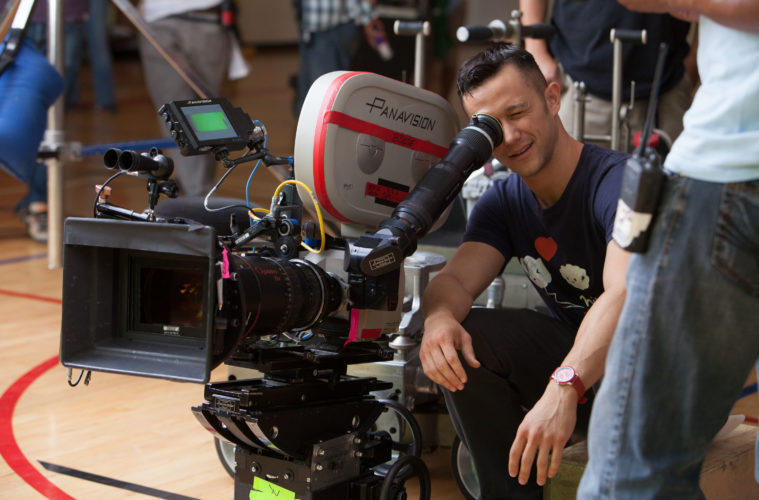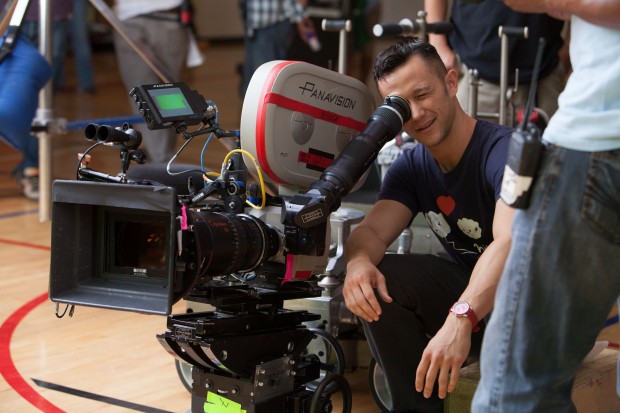
My respect for actor Joseph Gordon-Levitt was only further enhanced by his quality directorial debut, Don Jon. Playing an Italian American ladies man, Gordon-Levitt is not only transformed in his demeanor and style but also his psychical stature, showing that he clearly hit the gym and added several pounds of muscle, along with some hair gel to go with it. During SXSW I was able to sit down with him for a roundtable interview that delves into the making of the film, his own mentality of what it takes to create something like this, working with a mostly silent Brie Larson and much more. Check out our conversation below.
The Film Stage: How long has this idea to write and direct your movie been kind of cooking up in you mind?
Joseph Gordon-Levitt: I’ve worked with a ton of directors and I always just loved being on set, I loved the whole process. I love watching movies as well as making them. When you’re an actor, there are certain parts of the process that you just have nothing to with, like where the camera goes or how it’s cut, the music and things like that. So I was always really interested in being a part of that. I think a real turning point though, was for my twenty-first birthday — I’m thirty-two now — for my twenty-first birthday I bought myself my first copy of Final Cut Pro, which is a video editing software. And I started teaching myself how to edit and I loved it. I loved it so much I dropped out of college. I would stay up all night just making little videos, pointing the camera at myself, putting them on my computer, cutting together little short videos and stuff. It’s so much fun to me and I know that that’s what I wanted to do. Ever since then I’ve been pretty intent on making a movie and I made a ton of little short films and videos over the years, I mean, hundreds of them, and now I got to make a big one.
Porn is prevalent throughout the film. Can you talk about its influence in our society?
I think it’s a kind of media that’s really prominent in our culture today and this is a movie that talks about how different kinds of media influence our perspective on things and our expectations of things, and how rather than engaging in the present moment with individual people we often have a tendency to compare people to these expectations that we’ve learned from different kinds of media. Whether it’s pornography or Hollywood romantic movies or commercials or magazines, there’s all kinds of media.
So is that a viewpoint that stemmed from your work in romantic comedies?
I do think that, for sure. Having grown up on TV and in movies, it really put my focus on how does media impact our perspective and our cultures and our lives. And this is a comedy about how it impacts our love lives in particular and in that way I think it is a really personal movie.
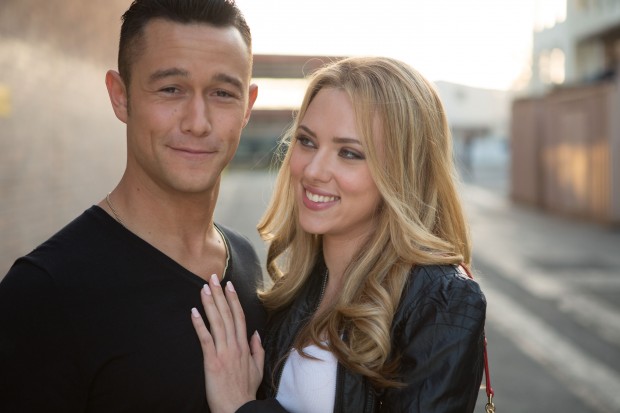
So tell us a little bit about how you came up with this idea. I mean, a nice boy from California playing Don Jon?
Well, the idea started with what I was just saying; I wanted to sort of tell a story about what I feel like is always getting in the way of love and that’s how we objectify each other and how media kind of contributes to that. So I thought a story about a guy who watches too much pornography and a girl who watches too many romantic Hollywood movies would be a really funny way at getting at those questions. So then I was the guy. I asked, “okay who is he and why is he watching too much pornography?” And I thought that if he’s just watching it because he can’t find a partner, that wouldn’t really get at the theme. But if he were a ladies man, if he were getting with all kinds of girls all the time but still had this habit, always going back to this one way, perfect objectification of pornography, that would really bring it out. And so I thought, “alright, well who’s the perfect ladies man?”
And that’s when I thought of the literary character of Don Juan and then I was thinking, “well, alright, how would I play Don Juan and what would be sort of a contemporary Don Juan?” It was actually while I was in Vancouver working on 50/50 with Seth Rogen and his whole posse and we were making this comedy, this sort of character-based comedy, that I thought, “oh what if I did it like that and made it funny?” And I thought, “alright well what’s that version of Don Juan?” My first idea was this machismo east coast guy with a gym body and shiny hair and all that and it made me laugh instantly. And that was it. I just loved the idea. I thought, “man, I could play that, it’d be really interesting.” I love playing characters that are really different from myself. I love challenging myself that way, I love finding a new way to talk and a new way to walk and I love wearing clothes that I wouldn’t normally wear. I love all that. And this character fits the bill.
Tony [Danza] said that he directed and he didn’t feel comfortable doing it. But he said that you seem like a natural director. I’m wondering, how did you like directing and how was it having people like Tony and Brie, working with them and also being in it yourself?
I loved it. Like I said, I’ve been on so many sets, I’ve seen so many directors do it and I’ve made so many little things on my own. I think that was really key, spending the time to make these little videos and cut them together. Because, while it’s obviously a very different medium and a short film is very different than a feature film, and you run into challenges making a feature film that you never run into making a short film, a lot of it’s the same — a lot of it. Just the way how to cut something together, how to make sound and image work together to tell a story. So I think it’s just a matter of practice and I’ve been really fortunate to work with a bunch of really great directors who’ve been really supportive. The year before I shot Don Jon I worked with Rian Johnson on Looper and then Chris Nolan on The Dark Night Rises and Steven Spielberg on Lincoln in one year. All three of those guys were really inspiring and there was a lot to learn watching them. That’s, I think, been the best education. That and, like I said, just kind of making things on my own.
I wanted to talk about the casting process and what were you looking for, especially with your family and with the character. Did you already have certain actors in mind when you were writing the story out?
Yeah. I had Scarlett in mind the entire time. From the very beginning of writing that character and I don’t know what I would have done if she didn’t like the script. I’m really fortunate that she did. I didn’t know her personally, I was just a fan of her work. I think she’s a really great actress and I went to Albuquerque where she was shooting The Avengers and I was able to arrange a meeting with her and told her about the movie, told her the story, told her why I wanted to tell that story. I gave her the script and I think she was really interested in what the movie’s about. It’s a movie about how we objectify each other, especially women and she if a woman who is objectified a lot. She’s a really smart person, she’s a really great artist and yet so much of what people talk about when it comes to her is just her surface looks. There’s so much more to talk about than that and I think she was really interested in sort of making fun of our culture that does that. That reduces a person like that to just a sex object and so she got on board and I’m glad she did. I feel lucky.
How challenging was it to write your character as a likeable one? A lot of people could argue that this guy is kind of a douche bag.
Sure. Especially at the beginning of the movie, yeah. That was always a fine line I wanted to walk and those are often times my favorite protagonists, the ones who aren’t just your perfect hero, who have their flaws and the things that you see in them. Like Warren Beatty’s character in Shampoo is a good example or Dustin Hoffman’s character in The Graduate. You like him, you’re rooting for him, but he does some shit that you’re like, “why are you doing that, dude? Come on.” But, you know what, that’s how people are. There isn’t a human being in the world that is perfect all the time. Likewise, I don’t think there’s a human being in the world that’s evil, that’s like bad all the time. Everyone’s sort of a mixture of both and so to me those are the most interesting characters.
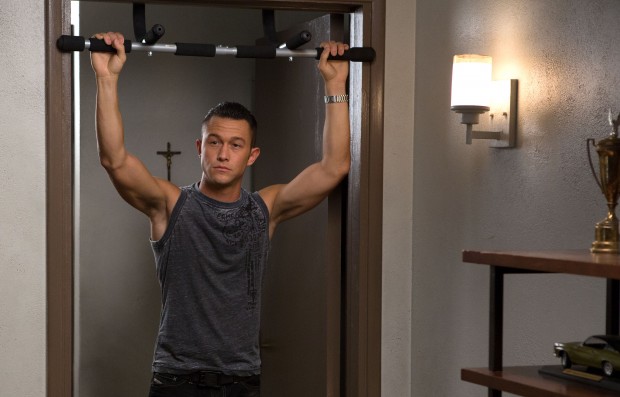
Can you briefly talk about your participation in Sin City, the character you played and what it’s like working with Robert Rodriguez?
Sure. I loved Robert, that’s really the reason I wanted to take that job because I’m a big fan of Mr. Rodriguez and Frank Miller. I loved the first movie and I was really intrigued by that process. I’ve never done a movie fully in front of a green screen before and I found it really fun. It’s sort of like doing theater. It’s a lot in your imagination and it’s sort of like playing pretend when you’re a kid and the priorities go straight to performance. Normally, on a film set, there’s so many things going on. You have to deal with production design, you have to deal with the location and the sun and you’re losing the light and all that stuff and it can really impact your ability to give a performance.
In Sin City, there’s none of that. It’s just about, we don’t have to worry about this location; there isn’t a location. We don’t have to worry about losing the light; we’re inside. So it really just comes down to performance and material and what they’re doing with the camera, and I love that. Robert’s just such a fun guy to be around. He’s just got creativity coming out of him all the time. He set up a painting studio next to set. He has all these canvasses and paint set up and this friend of his, George, is a great artist. He’s a painter sort of helping people and he just encourages you if there’s any down time to “go, go paint” and he goes and paints sometimes if there’s twenty minutes to kill or whatever. And I just love that as an attitude. This is not just a job, this is what he does for fun and you can tell when you watch his movies, the people making them are having fun doing it.
You said when you got Final Cut Pro you loved editing and as a writer, director and creator in general how do you know when to stop editing yourself?
That’s a great question. There’s a saying, I don’t know who it get attributed to, “no work of art is ever completed, it’s abandoned.” I really like that. There’s another saying that is attributed to Lorne Michaels, the creator of Saturday Night Live, and he says “we don’t put on the show because it’s done, we put it on because it’s Saturday at 11:30.” And I think there’s a lot of truth to that. And this film is not totally finished yet. We got together a version to play at Sundance because it was Sundance. We had to really hit the gas to make that deadline and now I feel really fortunate to, since the movie was well-received and people like it. Relativity bought it and is gonna put it out now, we have the opportunity to keep refining it and I’m really enjoying that. I think the movie’s really benefiting.
We talked a little bit about the editing process and do you think it’s gonna go through more edits because of the sex. Do you think the MPAA is gonna say something and you’re gonna have to cut it back a little bit more. Are you worried about that?
I’m not worried about it. That was always the premise of this movie. In fact, if you read the script, on the very first page is a note, a director’s note that says “this is going to be a rated R comedy.” It was always intended to be a mainstream pop movie. My intention was never to shock people, my intention was never to make something ultra provocative. I wanted a movie that was accessible and entertaining and relatable for everybody. So it says in this director’s note, “we will license real pornography clips and alter them to make them fit into an R-rated movie. And so what we presented at Sundance, we were pushing the envelope hard and we knew we were. Because it’s Sundance and why not? But since then we’ve refined those shots. We haven’t cut anything out.
The difference between the Sundance cut and the cut that’s playing tomorrow here at SXSW is four seconds and it’s only one shot. There was one shot that used to be eight seconds long and now it’s four seconds long. That’s the only time that actually got cut out. And by the way, that moment plays much better now that it’s shorter. Everything else is just refined; cropping something closer or saying, “maybe not this clip, maybe that clip instead.” But, no story points, no dialogue, nothing has been cut out. The movie’s really substantially the same and if anything it’s just better because it’s more refined. By putting in clips that are less sexually explicit, it forced me and my editor, Lauren, to come up with more clever ways to tell the story. Because at no point in these montages is it just showing pornography for the sake of showing pornography. Every little bit is sort of a story point. So we’ve been working on what images fulfill those story points and I think they’re definitely better now than they were at Sundance and we’re still working on it and I think it’s definitely getting better.
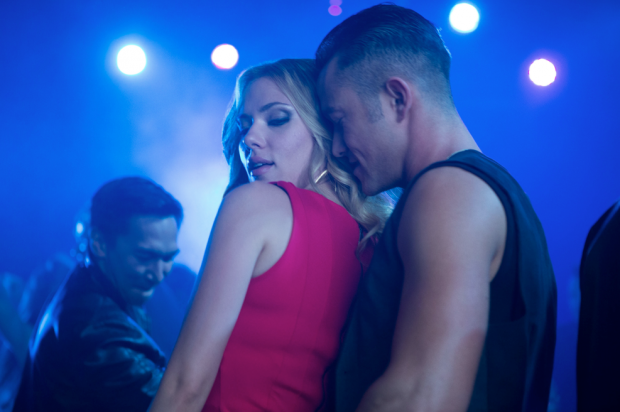
I think one of the funniest moments in the movie is your and Scarlett’s discussion about the fact that she doesn’t want you cleaning your house.
I’m glad you brought that up. I love that scene too.
I just wanna know about the genesis of that because it seems like most people would say “he cleans his house, he takes care of his stuff, that’s a good thing” and she’s coming from the background where-
Men aren’t supposed to do that.
Yeah. And I’m just wondering about the genesis of that and…
Well, that’s a lot of what the movie’s about, sort of these expectations, these molds that we’re sort of pressured into filling, of what a man is supposed to be versus what a woman is supposed to be. Both Jon and Barbara are very sort of trapped in these molds. So Barbara doesn’t like the fact that “he’s supposed to be a man, he’s supposed to be doing housework.” It’s obviously a ridiculous notion, but that’s the old fashioned way of thinking and Barbara clearly feels that way. This is actually a scene that we wrote late. We wrote it while we were in the middle of production, actually.
It’s one of the only scenes like that and I did it because Scarlett’s performance was so charming and compelling, I wanted to make sure that the audience wasn’t rooting for that relationship and really understood how problematic the Barbara Sugarman character is. And it’s sort of an idea that Scarlett and I came up with together and then I wrote a version of it. Then we sat down and rehearsed it and she said, “I don’t think this is quite right yet. Then we worked through it, rewrote it together and it’s one of my favorite scenes in the movie. I love it. I’m glad you singled that out.
It’s funny because throughout the movie, you see Brie Larson’s character constantly. She changes clothes and everything else but she’s doing the same thing and finally she speaks up and finally she has that line. Did you film all of her scenes in like a week or was she constantly on set doing nothing?
Well, she wasn’t doing nothing. Just because you don’t have lines doesn’t mean you’re doing nothing and that’s one of my favorite things about that performance. And, really, I find often times my favorite moment of any given performance are the moments where the actor isn’t speaking. And she gives a really nuanced and funny and genuine performance saying very, very little in the movie and it’s just a testament to her skills. I guess there are actors out there who count their lines and who wouldn’t wanna take this part because it doesn’t feel like it was a big enough part for them, or whatever. But the size of your part isn’t a linear scale with the number of your lines and she really proved that. Charlie Chaplin used to put on performances without any lines.
[Editor’s note: slight spoilers below.]
I liked how she was kind of the movie’s “Silent Bob.” She’s totally absorbed in technology and then at the end she turns out to be the wisest character in the whole thing. Do you think that her isolation from her family is why she’s so wise or her isolation from all of the media that everyone’s constantly absorbing?
I thought of it as kind of the other way around, that because she’s sort of over her family — not “over” as in superior but “over” as in, “I’m over it” — I see her as someone who’s kind of grown up a bit. She’s a few steps ahead of Jon. By the end of the movie Jon is starting to break out of his shell and engage with things and try to actually talk to his parents and he doesn’t have much luck. His parents are kind of close-minded people and I think the sister character has probably already come to that conclusion. By the time our story starts she’s like “these people don’t listen anyway so why should I speak?” And then in that final scene, and this is a spoiler I hesitate to give it away but for those who’ve seen it, when she does finally speak I think it’s because she sees, “oh, look, my brother is sort of saying something here, no one ever says anything at this table.” And so she engages.
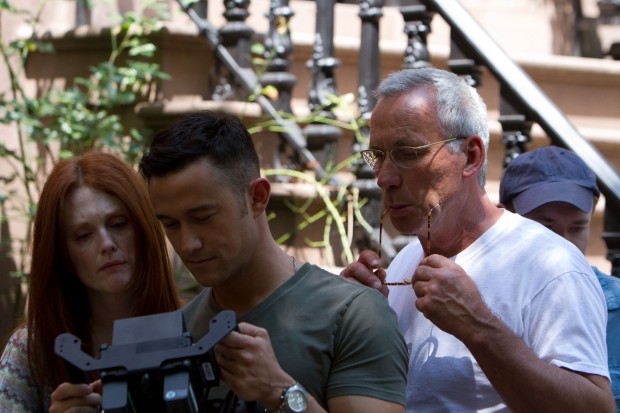
Don Jon hits theaters on Friday, September 27th.

